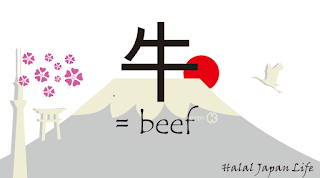Welcome back to Halal Japan Life!
As Muslims who travel to or live in Japan, we must concern about meals and beverages that we consume everyday. Alhamdulillah Japanese Government is now aware about Muslims and Halal Meals, but most of Japanese meals still don't have halal label yet. Moreover, as we know, almost all of the ingredients are written in Japanese language (kanji).
So, today, we will share to you 19 kanji ingredients we should avoid to eat only Halal food in Japan.
For you who want to see the full lists, go directly to the last section of this post (we provide an xls file).
1. Pork (buta)
The first one of course: pork. In Japanese, pork is "buta". The kanji is written like this:
2. Pork (butaniku)
Sometimes it is written as "butaniku":
3. Lard (raado)
4. Tonkatsu ramen
Derivative products from pork are "lard" and "tonkatsu ramen". "Lard" usually can be found in bread or instant noodle, while "tonkatsu ramen" can be found in "ramen".
The next one is about meat and its derivative products. We just talked about pork before which is obviously haram, and now we'll talk about other meat products. Why are they haram? Because not all meat products in Japan are slaughtered according to Islamic Rule. So we really need to concern, except for product which has halal label.
5. Meat (niku)
6. Meat extract (niku ekisu)
7. Shortening (syootoninggu)
"Shortening" can be found in bread, coffee, instant noodle, sometimes also cake and cookies. It is better to memorize this one because it can be found in almost every foods and beverages.
8. Animal shortening (doubutsu shootoninggu)
Sometimes Shortening is written more detail as "Doubutsu Shortening"
BUT, there's shortening that is edible for us, since it is made from palm oil. It's written as "Shootoninggu (paamu, yashi) "
9. Consomme powder (consome paudaa)
10. Gelatin (zerachin)
Gelatin is usually made from animal. For someone who loves ice cream, please be careful since gelatin can be found in almost every ice cream. Besides ice cream, gelatin can also be found in riceball (onigiri). Some also can be found in Japanese lunch box (bento)
11. Lecithin (reshichin)
Lecithin can be found in chocolate and ramen (japanese noodle). It can be made from animal or vegetable. If it is written as "Lecithin" only, it's be better to avoid it because we don't know what it is made from.
But If Lecithin is written as the picture below, then it's edible because it's made from vegetable
12 Margarin (maagarin)
Margarin is not always halal. It usually can be found in bread, cake, and biscuit. Since many of us eat bread as a substitute for rice, please pay attention since almost every bread has "margarin" on it.
13. Fat
For fat, there are actually fat from vegetable if it's written like this one below.
14. Emulsifier (nyuukazai)
"Nyuukazai" usually can be found in beverages,such as coffee, some latte, milk tea, etc. This nyuukazai, if it's written only like this below, we'd better to avoid it since we don't know whether it's from animal or vegetable.
But if it's written like this below, then it's edible since it's made from soy bean.
15 Beef (gyuu / beefu)
16. Beef (gyuu niku)
Sometimes beef is written as "gyuuniku"
17. Beef consomme (beefu konsome)
Beef consomme is derivative product from "gyuuniku".
18. Beef extract (beefu ekisu)
Beef extract is also derivative product from "gyuuniku". Most of beef and its derivative products can be found in snacks such as chips, potato chips, all kinds of instant soup, etc.
19. Chicken (chikin)
20. Chicken Extract (chikin ekisu)
Same with beef, chicken has its derivative product such as chicken consomme. But most of the products rarely use it as ingredients. They use chicken extract instead of it.
So that was 20 kanji ingredients we should avoid from food in Japan. BUT please note, there are more ingredients that we haven't mentioned, especially alcoholic ingredients. So please stay tune here at halaljapanlife.blogspot.com.
If you want to see more details, please watch our video:
Like and subscribe for more! Give your thoughts about halal and haram ingredients on comment section. See you again!
Assalamu'alaikum!






















beef niku is halal, right? And for contained animal word, like animal shortening. if its animal is chicken or beef, is not okay?
ReplyDeleteSince Japan is not moslem country, any animal produce aren't merely halal. Please do remember that cow, chicken, etc. must be slaughtered in the name of Allah, by a moslem, with proper technique according to sharia. Otherwise, it is haraam.
ReplyDeleteKatakana is NOT kanji
ReplyDeleteIn some food like in yeast or in top value cheese, emulsifier is written with another ingredients with '/' for example 'almond/emulsifier'. Can we consume product like this?
ReplyDeleteKakidane is halal right?? Please inform me soon, i really in doubt.
ReplyDeleteDo you mean "Kakinotane" ?
DeleteI noticed some kakinotane ingredient pork extract.
https://www.kameda-netshop.jp/smp/item/983157.html
Deleteyou can see "豚を含む" means "including pork".
Hey guys this is Deepthi, I am your admission counselor for Japanese universities.Types of food in Japan In today’s video, we will be discussing a very interesting topic, and that is Japanese cuisine. Japanese cuisine has been rapidly increasing in popularity around the world, mainly due to the frequent representation of sushi and ramen noodles in the mainstream media.
ReplyDelete